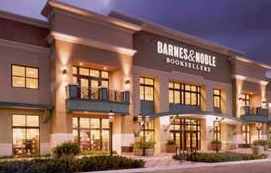
As the Kindle soars in popularity, at least one bookstore is already in trouble. Barnes and Noble put itself up for sale, and New York Magazine just ran a touching profile of the company’s founder,
69-year-old Leonard Riggio.
“I still like books,” he said, though it didn’t really need saying. All around him, in a conference room that evoked an elegant old library, were shelves lined with hardbound classics. Books had made Riggio a fortune… Books had been very good to him, and now they were dissolving into the ether…Riggio wanted to say something, but he couldn’t quite find the words, so he burst out of his chair and charged over to one wall. “I don’t know how you can intellectualize this,” he said, “but a book is …” To continue his thought, he pulled down a copy of ‘The Count of Monte Cristo’, shook it, felt its substance. “This bound volume of Dumas is content. We have to understand people want to own this content. They want this. It’s very important.”
The magazine’s reporter visited the million-square-foot warehouse in New Jersey where Barnes and Nobles has its East coast distribution hub. (It’s “long enough to fit the Empire State Building sideways,” and stocks at least two copies of every single title that’s in print.) The article makes an interesting point: that bookstores earn more money on book sales than the publishers do. (Though Riggio once argued that “People in the world of literature tend to look down on people who make a profit.”)
Yet today, the hardware-based Kindle is Amazon’s best-selling product, and the Nook is also Barnes and Nobles’ best-selling product. “As [their new CEO] sees it, the superstores can serve as platforms for marketing their own replacement technology,” the magazine notes. “Walk into any Barnes & Noble, and the first thing you’ll see is what Lynch calls the ‘shrine’ — a counter where salespeople introduce the Nook. ”
But at the middle of this historic change is a 69-year-old man who founded a chain of bookstores. Now he’s left with a tablet-sized piece of electronics in his hand, and New York Magazine seems to
catch him showing some ambivalence.
“You know, I’m going through a thing — the record shows how old I am,” he said. “I’m going through, you know, like, ‘Oh my God, do I need this? At this period in time, to be as busy as I am…?'”“If this was a Nook,” Riggio said as he flipped through the pages of The Count of Monte Cristo, “I just look at is as, well, here are the pages, and we magically erase the pages and another book appears.” As a business strategy, he was wagering that this convenience would inspire readers to spend more. But personally, Riggio remains unswayed. He doesn’t use his own Nook. “I like to hold the book instead of the device,” he said. “I would rather own multiple books than a single book that carries everything.”
And there you have it: The head of the company that sells the Nook doesn’t actually want to use a Nook. As New York Magazine puts it, “for all his newfound enthusiasm, he still can’t imagine a world in which the bookstore — or what he likes to call the ‘cultural piazza’ — is replicated by a piece of plastic…”
Thanks to Mike Cane for the link.
And click here to get The Count of Monte Cristo as a free Kindle ebook!
Change is difficult but you can’t stop it. I’m sure the makers of wagons, managers of stables, etc. felt the same way when automobiles began to be manufactured.
I love books too, and having the ability to carry thousands with me in a device smaller than one book is an amazing thing.
What makes books so wonderful are the ideas and words within them, not the physical entity.